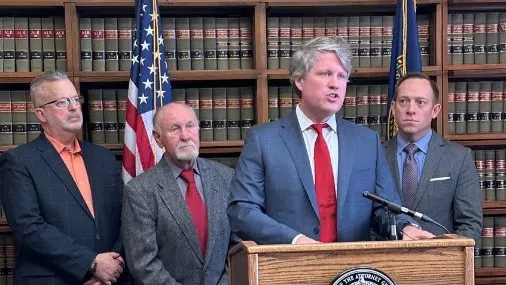Nebraska Attorney General Mike Hilgers is suing several major truck manufacturers for allegedly conspiring to phase out diesel-powered semi-trucks for electric trucks, claiming a 2023 collective agreement violates anti-trust law and unfairly limits competition.
Last year, the nation’s leading truck manufacturers and the Truck and Engine Manufacturers Association pledged to follow a “Clean Truck Partnership,” in order to comply with regulations put forth by the California Air Resources Board (CARB). According to CARB, the agreement “advances the development of zero-emission vehicles (ZEVs) for the commercial trucking industry, which includes flexibility for manufacturers to meet emissions requirements while still reaching the state’s climate and emission reduction goals.”
Among the agreements in the partnership, companies are committed to meet California’s vehicle standards and will require the sale and adoption of zero-emissions technology in the state, regardless of whether any other entity challenges California’s authority to set more stringent emissions standards under the federal Clean Air Act.
As detailed in Hilgers’ suit, these manufactures (such as Daimler, Navistar, Paccar, and Volvo) dominate the trucking market in the state. Compliance with these guidelines could harm Nebraska’s economy, he claims. Further, by acting together in signing this pledge, Hilgers alleges the agreements constitutes “collusion” — violating federal anti-trust law and engaging in anti-competitive practices.
“Eliminating diesel-powered semi-trucks is practically impossible to accomplish and would impose enormous costs on Nebraska and Nebraska companies. That is why Nebraska sued California officials from issuing an anti-democratic regulation to eliminate diesel-powered semis in their state,” said Attorney General Hilgers.
The suit, joined by Energy Marketers of America and Renewable Fuels Nebraska, projects that the elimination of diesel trucks could increase costs for Nebraska businesses, rise the cost of consumer products, and hurt jobs tied to the trucking industry. Hilgers also emphasizes that Nebraska is not outfitted to support a growing fleet of electric vehicles.
While Hilgers will have to prove this agreement has an anti-competitive intent or effect and would lead to consumer harm, defendants might argue they are simply responding to California regulations, not conspiring. Additionally, a court may deem that complying with environmental goals/regulations would justify the partnership, and supporting electric trucks is a legitimate business strategy.
